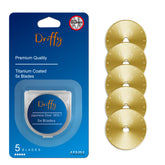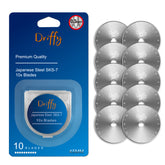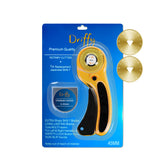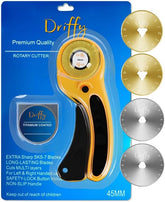Picking the right fabrics for your quilts
|
Going into a fabric shop to pick materials can feel like quite an overwhelming task. There are so many options to choose from that it might seem a bit bewildering at first. Quilters with many years experience tend to know what to go for straight away. If you’re new to the hobby, what tips and tricks are there to help you make the right choices? Your fabrics don’t always need to match At first, when you’re learning to keep things as relatively simple as possible - work within a similar colour palette and keep your choices narrower. Fabric manufacturers will often offer guides and methods to help you select what you need, and sewers who frequent fabric shops will also be able to offer guidance, so never be afraid to ask for help. As you become more adept, you can loosen up with your choices and become a bit more free and easy. |
|
|
If you find a fabric that you simply adore when you’re in a fabric shop, take a sneaky look at it’s selvage edges. These are the edges that run along the lengthwise grain of the fabric and are tightly bound. Often they have little dots stamped all over them - and you can use these dots as a guide to compare and select other fabrics from the same manufacturer. A selvage will also often include the name of the company who produced the fabric, and its designer which can be helpful when you’re trying to find similar fabrics at a later date. Fabrics used for quilting are often produced in coordinating groups, and the manufacturers that make them will provide what is known as ‘blender’ fabrics, that offer different tones to match in with their own fabrics and that of other companies. These coordinated fabrics are often a good idea as a starting point for a quilt. It’s worth bearing a few points in mind: Make sure the collections you pick from have a good selection of print scales and that these work with the patterns you’ve chosen. Is there a good variety of contrasting fabrics that blend together well? Beware of manufacturers that sell coordinating fabrics in pre-cut bundles, they need to be checked thoroughly for the size of their print and how well they contrast. . Any fabric you buy, no matter what project it is for is an investment and should be treated as such. Anything you buy should be of the highest possible quality within your budget.. Similarly, don’t focus on one type of fabric either - like florals, or stripes. Keep your fabric stash as diverse as possible. Likewise, in terms of the prints you choose, select prints of varying scales, from very small intricate designs to big bold features. Re-examine your stash from time to time Every so often, look at your stash. Think about what might be missing, or what you need for future projects. When you go to the fabric store take a list with you and find fill-in fabrics that you think will sit well in your collection. It might seem like an anathema but think outside the box, buy colours you might not choose at first glance. You never know when these might come in handy even in the smallest amounts. Choosing a quilt pattern Start off with something easy, and that you know you’ll be able to handle properly. Keep it simple and choose a pattern that won’t require a lot of different fabrics. This will allow you to gently lower yourself into your hobby and not become too overwhelmed with choice and technique. As your confidence builds you can allow yourself more leeway to go for bigger, bolder designs and more complicated patterns. Remember, more often than not quilters won’t like the very first quilt they make. It’s important to remember not to obsess too much and worry about every mistake you make. Have fun, experiment, and fall in love with your hobby! Perfection comes with practice.
|
|











Leave a comment
Please note, comments need to be approved before they are published.